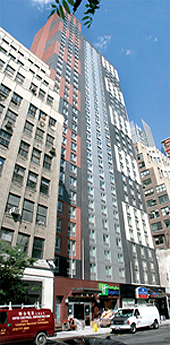 Three West 39th Street hotels by Sam Chang
Three West 39th Street hotels by Sam ChangFrom the August issue: Despite the wretched outlook for New York City’s lodging sector, construction workers in hardhats and neon orange vests gathered with real estate executives on gritty West 39th Street last month for a small moment of hotel-related celebration.
They stood gazing upwards in respectful silence as an American flag zoomed through the blue sky on a pulley, headed for the top of the hotel, developed by Sam Chang, under construction between Eighth and Ninth avenues in the shadow of the Port Authority, which had hit a construction milestone.
Afterward, as the hardhats got back to work and three massive cement mixers churned away in the street, one suit asked another: “Did someone copy Sam on the invitation?”
Chang, however, was nowhere in sight. After all, the Element by Westin hotel at 311 West 39th is just one of roughly 17 local projects of his company, the McSam Hotel Group. The hotelier has his hands full with developments during an unprecedented slump in the U.S. economy that’s savaging the formerly robust lodging sector.
In a different project down the street, Chang is developing three hotels in one West 39th Street building — with separate entrances at 337, 339 and 343 West 39th Street — which he dubbed his “most painful” project ever.
“It’s the timing,” he told The Real Deal. “If this was three years ago, none [of my projects] were painful, they were all beautiful, but now every project is painful for the developer.”
Last month, it seemed that pain, at least on 39th Street, was finally abating.
The three hotels — a Hampton Inn with 184 rooms, a Candlewood Suites with 186 rooms and a Holiday Inn with 210 rooms — finally opened after at least six months of delays.
Most importantly, Chang, who likes to build and sell off hotels, finally lined up a buyer, as The Real Deal reported late last month. A knowledgeable source said the new owner for all three hotels will be Hersha Hospitality Trust, a Philadelphia-based, publicly traded REIT that has done deals with Chang before. Chang denied Hersha is the buyer, but noted he has signed a strict confidentiality agreement related to the sale.
Gary Wisinski, chief operating officer of McSam Hotel Group, said he expects the deal to close this month. He declined to disclose the sale price or purchaser’s identity, but said the buyer is “a different one” than McSam had lined up in the past for the properties.
The twisting road to Chang’s new deal illustrates the changing economics of his business and budget hotel deals in New York.
In general, hotel dealmakers said hotel values have fallen 35 to 50 percent from their peak three years ago.
As hotel values plummet, the macro factors hitting Chang and every other hotel developer continue raging. Business and leisure travelers who had pushed hotel occupancy levels in the city well above 80 percent are putting the brakes on travel to save money during the recession. That has sent room rates and occupancy levels into free fall, eroding the cash from operations that underpins hotel deals.
According to several sources with knowledge of McSam’s transactions, before beginning construction on 39th Street, Chang had worked out a deal with Washington, D.C.-based private equity firm Carlyle Group and acquisition, development and management company Gemini Real Estate Advisors.
They had options on the hotel at about $300,000 a key. Once the economy began tanking last fall and the credit markets froze, Carlyle and Gemini could not find a buyer for their options at the price they wanted, $500,000 a key. Unwilling to put up funds, Carlyle walked, leaving Chang scrambling.
Chang confirmed the involvement of Gemini and Carlyle, saying they dropped out last fall because they could not obtain financing.
Now the big issues are what price these three hotels ended up fetching in a radically downshifted market and what concessions Chang will have to make to close the deal.
Seller financing, where the seller provides a short-term mortgage of six to 24 months for a buyer, is coming back into fashion and could be an option for Chang.
“In every asset class, realistic sellers are holding paper on first and sometimes second mortgages to close the transaction, something we haven’t seen in 10 years,” said Alan Miller, senior director at Eastern Consolidated.
Chang said he has never provided financing previously, but he recognizes the hotel sales game has changed. “Maybe, depending on the price and who the buyer is in the future,” he said.
Chang’s decision to pioneer a new hotel district on Manhattan’s Far West Side poses additional challenges. The area, bounded by the Lincoln Tunnel and Port Authority, is a gritty fringe district with lots of noise, the highest concentration of new hotels in any neighborhood in the city and few perks.
Now that rates are dropping at the city’s most storied, sought-after hotels, travelers still visiting the city have their pick of prime locations.
Likewise, the need for more hotels near the Javits Center on West 34th Street and 12th Avenue has dropped along with attendance at shows there.
“It was like the Twilight Zone west of Eighth Avenue, and no one even thought of building there with so little retail and amenities,” said Barbara Byrne Denham, chief economist at Eastern Consolidated. “It’s definitely challenging.”